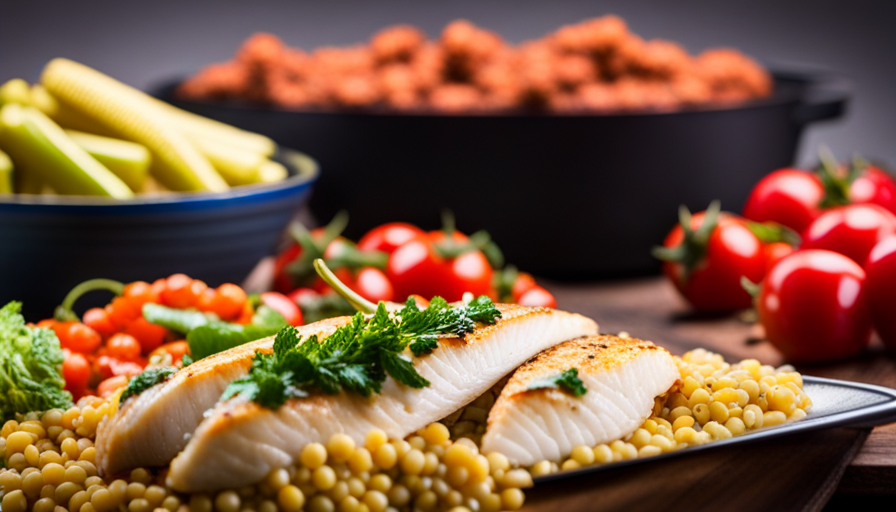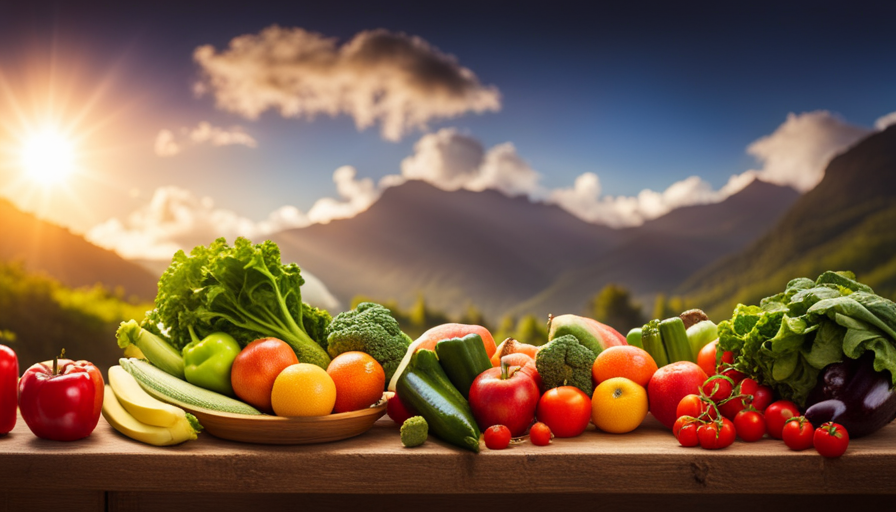Are you prepared for a food revolution that will revolutionize your health? Prepare yourself for an epic battle between raw and cooked food diets!
Brace yourself for an eye-opening journey where we delve into the depths of nutrition and explore which diet reigns supreme.
Imagine a diet so powerful it can boost your energy levels to unimaginable heights, enhance digestion, and supercharge your immune system. On the other hand, picture a diet that unlocks hidden nutrients, increases the availability of antioxidants, and makes certain foods easier to digest. These are just a taste of the many benefits that raw and cooked food diets promise.
But wait, it’s not all sunshine and rainbows. Both diets have their drawbacks too. From potential nutrient deficiencies to increased risk of foodborne illnesses, there’s a lot to consider.
So, which diet is better for human health? Join me as we uncover the truth behind raw vs. cooked food diets and find the perfect balance that suits your individual needs. Let the battle begin!
Key Takeaways
- Raw food diets retain more nutrients compared to cooked food.
- Cooking methods can enhance the nutritional benefits of food.
- Finding the right balance between raw and cooked foods is important for optimizing health and well-being.
- Personal health goals, lifestyle choices, and cultural considerations play a significant role in determining the suitable diet.
Nutritional Benefits of Raw Food Diets
If you want to boost your health and maximize your nutrient intake, a raw food diet is the way to go! Raw food nutrition offers numerous benefits that can contribute to overall well-being.
One key advantage of raw diets is that they retain more nutrients compared to cooked food. Heat can destroy certain vitamins and minerals, so by consuming raw fruits, vegetables, nuts, and seeds, you can ensure you’re getting the maximum nutritional value from these foods.
Raw diets are also rich in enzymes, which help with digestion and nutrient absorption. Enzymes are naturally present in raw foods, but they can be destroyed by cooking.
Additionally, raw diets are high in fiber, which aids in digestion, promotes satiety, and supports a healthy gut.
Another benefit of raw food diets is the abundance of antioxidants they provide. Antioxidants help protect the body against oxidative stress and reduce the risk of chronic diseases.
In conclusion, raw food diets offer numerous nutritional benefits that can enhance overall health and well-being. However, it’s important to consider the potential health benefits of cooked food diets as well.
Health Benefits of Cooked Food Diets
Although there are numerous ways to prepare meals, it’s undeniable that the advantages of consuming cooked food go beyond mere taste and convenience.
Cooking methods play a crucial role in enhancing the nutritional benefits of food. Heat helps break down the tough fibers and cell walls present in raw ingredients, making it easier for our bodies to absorb the nutrients.
For instance, cooking vegetables like spinach and tomatoes increases the availability of important antioxidants such as lycopene and beta-carotene. Additionally, the cooking process can destroy harmful bacteria and parasites that might be present in raw meat and seafood, reducing the risk of foodborne illnesses.
Moreover, cooking can actually increase the bioavailability of certain nutrients. For example, heat can release more lutein from vegetables like kale and broccoli, which is essential for maintaining healthy vision. Studies have also shown that cooked foods can provide higher levels of certain minerals like calcium and iron compared to their raw counterparts.
Furthermore, cooking can enhance the flavors and aromas of food, making it more enjoyable to eat and potentially encouraging a greater intake of nutrient-rich meals.
Cooking food not only improves taste and convenience but also enhances nutrient absorption and availability. However, it’s important to explore the potential drawbacks of raw food diets to make an informed decision about our dietary choices.
Potential Drawbacks of Raw Food Diets
When considering the potential drawbacks of raw food diets, several key points come to mind. First and foremost, there is an increased risk of foodborne illnesses associated with consuming raw foods. This is due to the fact that raw foods are not subjected to the same cooking process that kills harmful bacteria and parasites.
Additionally, it may be more difficult to meet all of our nutritional needs on a raw food diet, as certain nutrients are more readily available and absorbed when foods are cooked.
Lastly, the limited food variety on a raw food diet may make it challenging to maintain a balanced and diverse diet that provides all of the necessary nutrients for optimal health.
Risk of Foodborne Illnesses
To minimize your risk of foodborne illnesses, it’s important to properly handle and cook your food. Cooking food kills harmful bacteria and other pathogens that can cause illness.
Here are some key food safety practices to follow:
- Wash your hands thoroughly before and after handling food.
- Separate raw and cooked foods to prevent cross-contamination.
- Use a food thermometer to ensure that meat, poultry, and fish are cooked to the appropriate internal temperature.
- Store perishable foods in the refrigerator at the right temperature.
By following these cooking methods and food safety practices, you can greatly reduce the risk of foodborne illnesses. However, it’s important to note that there are other factors to consider when choosing between raw and cooked food diets. One of these is the difficulty in meeting nutritional needs.
Difficulty in Meeting Nutritional Needs
Meeting nutritional needs can be challenging, as studies have shown that a significant percentage of people worldwide are deficient in essential vitamins and minerals. This challenge becomes even more pronounced when following a raw food diet. While raw food enthusiasts argue that cooking destroys nutrients, scientific evidence suggests that cooking actually enhances the bioavailability of certain nutrients. For example, cooking vegetables can increase the absorption of important antioxidants like beta-carotene and lycopene. Additionally, some essential nutrients like vitamin B12 are only found in animal products, which are typically consumed in cooked form. Therefore, individuals on a raw food diet may face difficulties in meeting their nutritional requirements, potentially leading to deficiencies.
Transitioning to the next section, limited food variety also plays a significant role in the overall nutritional adequacy of different diets.
Limited Food Variety
Indulge yourself in a wide array of flavors and textures by exploring a diverse range of ingredients in your meals. When it comes to food preferences, a cooked food diet may offer a greater variety compared to a raw food diet. Cooking methods such as roasting, grilling, and sautéing can enhance the taste and aroma of foods, making them more appealing to different palates.
Additionally, cooking can also break down tough fibers in certain vegetables, making them easier to chew and digest. However, it’s important to note that cooking can result in nutrient loss. Some vitamins, such as vitamin C and B vitamins, are heat-sensitive and can be diminished when exposed to high temperatures. To minimize nutrient loss, it’s recommended to cook vegetables using methods that retain as much of their natural moisture as possible, such as steaming or microwaving.
Transitioning into the subsequent section about potential drawbacks of cooked food diets, it’s crucial to consider the impact of cooking on the nutritional value of our meals.
Potential Drawbacks of Cooked Food Diets
Although cooked food diets have their benefits, you may want to consider that they can lead to a decrease in nutrient content due to the cooking process. Cooking can cause the loss of certain vitamins and minerals, such as vitamin C and some B vitamins, which are sensitive to heat. Additionally, high-temperature cooking methods like frying or grilling can generate harmful compounds, such as acrylamide and polycyclic aromatic hydrocarbons, which have been linked to increased cancer risk.
Cooking food also affects its digestibility. While cooking can break down tough fibers and make food easier to chew and swallow, it can also make some nutrients less accessible to our bodies. For example, heat can denature proteins, making them less digestible and potentially leading to decreased protein absorption. Furthermore, cooking can alter the composition of carbohydrates, making them more easily absorbed and potentially leading to blood sugar spikes.
Another potential drawback of cooked food diets is their impact on the gut microbiome. Studies have shown that heat can destroy or alter the beneficial bacteria in our food, which can have a negative impact on our gut health. A diverse and balanced gut microbiome is essential for proper digestion, nutrient absorption, and overall health.
While cooked food diets have their advantages, such as improved digestibility and enhanced flavors, it is important to be aware of their potential drawbacks. The decrease in nutrient content, impact on digestion, and alteration of the gut microbiome should be considered when choosing between raw and cooked food. Finding the right balance between raw and cooked foods may be key to optimizing our health and well-being.
Finding the Right Balance
Achieving a harmonious balance between the way I nourish my body can lead to a greater sense of vitality and overall well-being. When it comes to raw versus cooked food diets, finding the right balance is key.
It’s important to consider alternatives and experiment with a variety of recipes to ensure a well-rounded and nutritious diet.
Here are three ways to find the right balance:
-
Incorporate raw foods: Raw fruits and vegetables are packed with vitamins, minerals, and enzymes that can be beneficial for our health. Adding a variety of raw foods to our diet can provide us with essential nutrients that may be lost during cooking.
-
Cook certain foods: While raw foods have their benefits, cooking certain foods can make them easier to digest and increase their nutrient availability. For example, cooking tomatoes can enhance the absorption of lycopene, a powerful antioxidant.
-
Listen to your body: Everyone’s dietary needs are unique. It’s important to pay attention to how different foods make you feel. Experiment with both raw and cooked foods and observe how your body responds. This will help you determine the right balance for your individual needs.
Considering individual factors such as taste preferences, health conditions, and lifestyle choices is crucial when finding the right balance. By exploring alternatives and experimenting with recipes, we can discover a diet that nourishes our bodies and promotes optimal health.
Considering Individual Factors
When considering the best diet for my personal health goals, I take into account factors such as my digestive system sensitivities, lifestyle, and cultural considerations.
Understanding my own body’s needs and tolerances helps me make informed choices about the types of foods that will support my overall well-being.
Furthermore, I recognize that my lifestyle and cultural background may influence the availability and acceptability of certain foods, which I consider when planning my meals.
Personal Health Goals
If you want to reach your personal health goals, choosing between a raw or cooked food diet can be a suspenseful decision. Personal preferences play a significant role in determining which diet is suitable for an individual. Some people enjoy the crispness and natural flavors of raw foods, while others prefer the warmth and comforting textures of cooked meals.
Additionally, considering the long-term sustainability of a diet is crucial. Raw food diets require careful planning to ensure all nutritional needs are met, while cooked food diets offer more variety and flexibility. It’s important to find a balance that aligns with personal preferences and can be sustained over time.
Transitioning into the next section about digestive system sensitivities, it’s essential to understand how our bodies react to different types of food.
Digestive System Sensitivities
Before diving into the discussion of digestive system sensitivities, it’s important to note that personal health goals play a crucial role in determining the most suitable diet.
However, it’s worth considering that some individuals may have specific digestive disorders or food intolerances that can greatly impact their dietary choices. Digestive disorders such as irritable bowel syndrome (IBS), Crohn’s disease, and celiac disease can make it challenging for individuals to digest certain types of foods. Additionally, food intolerances, such as lactose intolerance or gluten sensitivity, can further limit food options.
Understanding these sensitivities is crucial when deciding between raw and cooked food diets, as certain cooking methods can help alleviate symptoms or make certain foods easier to digest.
Moving forward, it’s essential to explore the impact of lifestyle and cultural considerations on dietary choices.
Lifestyle and Cultural Considerations
Lifestyle and cultural considerations play a significant role in determining our dietary choices, adding a delightful variety to our meals. When it comes to choosing between raw and cooked food diets, cultural impact and dietary restrictions can heavily influence our decision. Different cultures have their own traditional ways of preparing and consuming food, which are deeply rooted in their history and values. These cultural practices often shape our preferences and habits regarding food. Additionally, dietary restrictions, such as allergies or intolerances, can limit our choices and steer us towards certain types of diets. For instance, individuals with lactose intolerance may opt for a raw food diet that avoids dairy products altogether. Taking these factors into account is essential when considering which type of diet is best for our individual health needs.
| Cultural Impact | Dietary Restrictions |
|---|---|
| Celebratory feasts | Gluten-free diets |
| Spices and flavors | Vegan or vegetarian diets |
| Food taboos | Nut or seafood allergies |
By understanding the cultural impact and considering our dietary restrictions, we can make informed choices that support our overall well-being while still embracing the diversity and richness of the culinary world.
Frequently Asked Questions
Can raw food diets provide all the necessary nutrients for a healthy human diet?
Oh, raw food diets, the ultimate health trend. Can they provide all the necessary nutrients for a healthy human diet?
Well, let’s talk about raw food safety first. Raw foods can sometimes harbor harmful bacteria, so proper preparation techniques are crucial. However, when it comes to nutrient content, raw foods can be a great source of vitamins, minerals, and enzymes. Just remember to balance your diet and consult a professional before going all-in on the raw food train.
Are there any specific health benefits associated with cooking food?
There are several specific health benefits associated with cooking food. Cooking can increase the bioavailability of certain nutrients, making them easier for our bodies to absorb. For example, cooking vegetables can break down their tough cell walls and make the nutrients more accessible.
Additionally, cooking can help kill harmful bacteria and parasites that may be present in raw food. Overall, cooking food can enhance nutrient absorption and reduce the risk of foodborne illnesses.
Are there any potential risks or drawbacks to consuming raw food diets?
When it comes to consuming raw food diets, there are potential health risks that need to be considered. One major concern is the risk of foodborne illnesses. Raw foods, especially meat, eggs, and seafood, can harbor harmful bacteria like Salmonella and E. coli. These bacteria can cause severe gastrointestinal issues and even lead to hospitalization. It’s important to handle and prepare raw foods with caution to minimize the risk of foodborne illnesses.
Can cooking food lead to the loss of important nutrients?
Yes, cooking food can lead to the loss of important nutrients. High temperatures and prolonged cooking times can cause the breakdown and degradation of vitamins, minerals, and other nutrients in food.
For example, water-soluble vitamins like vitamin C and B vitamins are particularly vulnerable to heat and can be lost during the cooking process. However, it’s important to note that cooking can also enhance the availability of certain nutrients, such as lycopene in tomatoes.
Overall, the impact of cooking on the nutritional value of food depends on the specific food and cooking method used.
How can individuals determine the right balance between raw and cooked food in their diet based on their individual factors?
When determining the right balance between raw and cooked food in my diet, I consider my individual preferences and nutritional requirements.
I listen to my body and pay attention to how certain foods make me feel. I also consult with a registered dietitian for personalized advice.
It’s important to note that both raw and cooked foods have their benefits. Raw foods may retain more nutrients, while cooking can enhance digestibility and kill harmful bacteria.
Striking a balance that works for me is key.
Can a Raw Food Diet Negatively Impact Health When Someone Is Sick?
While raw food and sickness may seem contradictory, a raw food diet can actually have negative effects on health when someone is sick. Raw fruits and vegetables, while nutritious, may be harder for the body to digest when the immune system is compromised. This can worsen symptoms and hinder recovery.
Conclusion
In conclusion, finding the right balance between raw and cooked food diets is like walking a tightrope between taste and nutrition. While raw food diets offer the crisp freshness of a summer breeze, cooked food diets provide the comforting warmth of a cozy fireplace.
It’s essential to consider individual factors such as personal preferences and dietary needs when making this decision. Ultimately, a diverse and well-rounded approach that incorporates both raw and cooked foods is likely to offer the best of both worlds for optimal human health.










